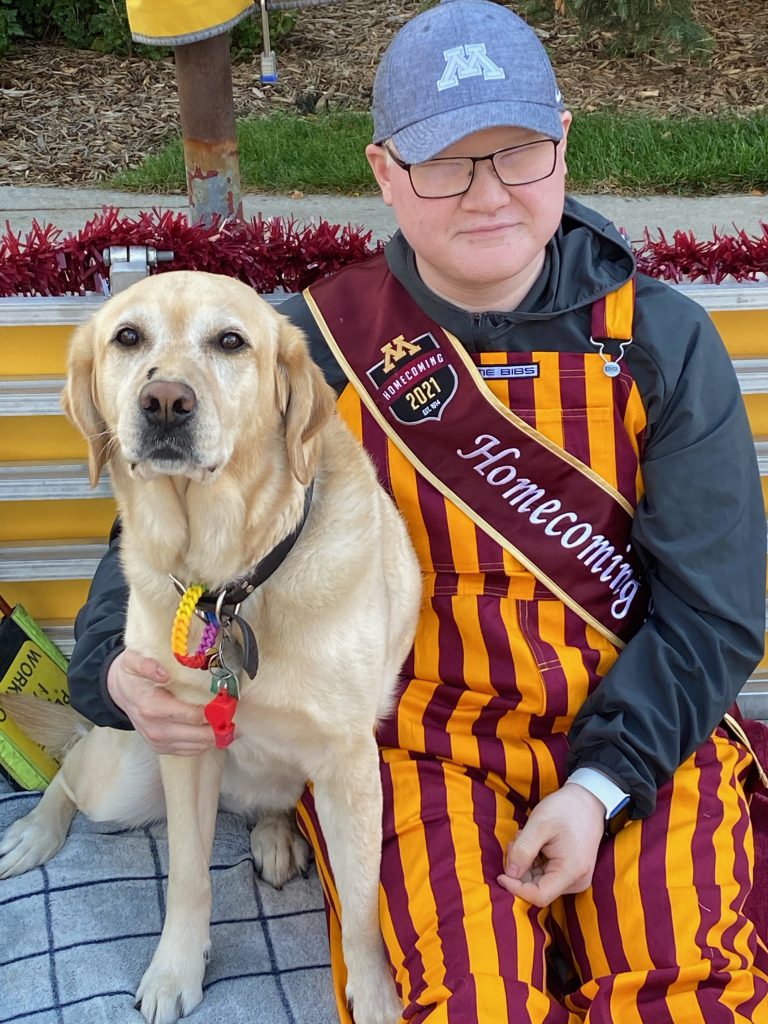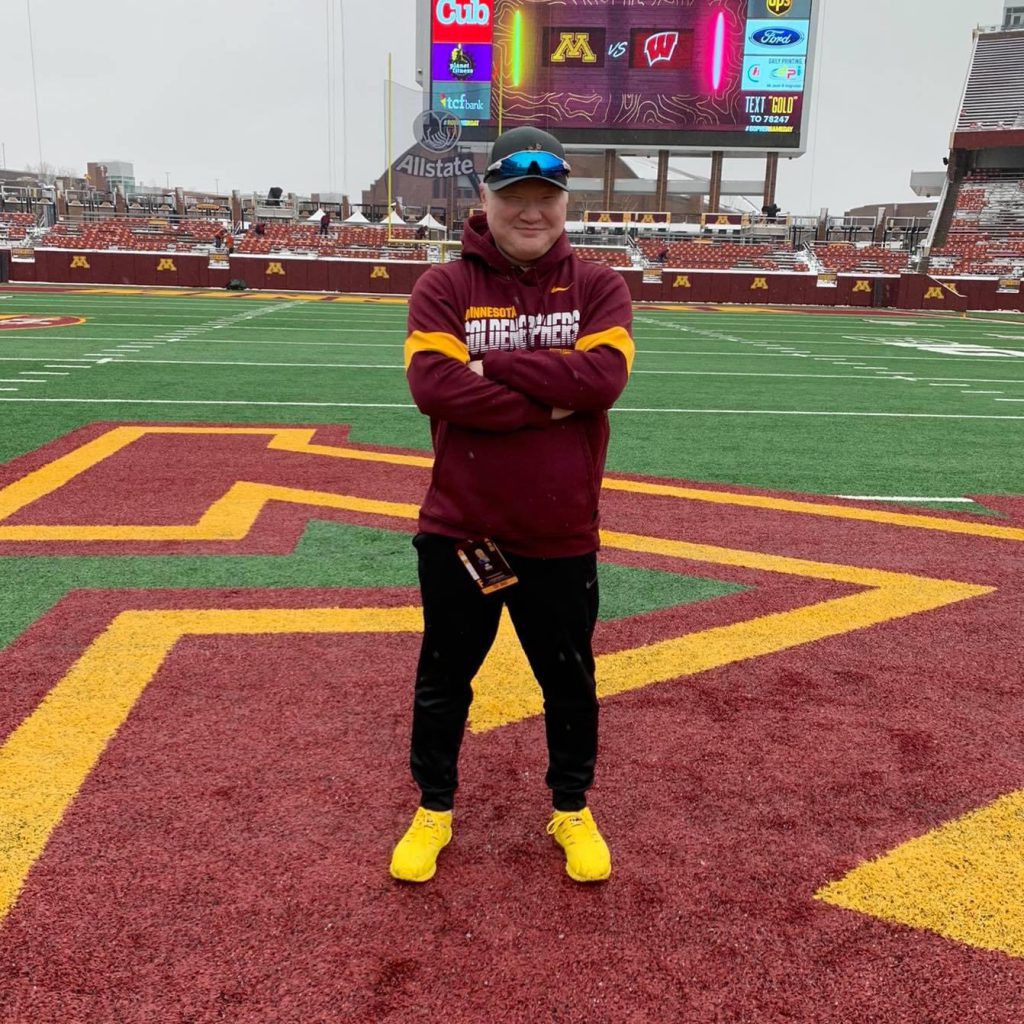The School of Kinesiology‘s Ian Moon, a senior majoring in Sport Management and minoring in Coaching, was recently voted to the University of Minnesota’s homecoming court. Learn more about Ian’s passion for sport and his advice on overcoming obstacles.
Tell us a little bit about yourself. Where are you originally from? What drew you to the U of MN?
My name is Ian. I was actually adopted from China when I was 6. When I was adopted we lived in Michigan for a little bit and then we moved to Minnesota. So I’ve been in Minnesota for about 14 years. I grew up most of my life here so I am Minnesota “born and raised” as I like to say. What drew me to the U was my parents always had a big dream about a kid being at a Big Ten college. My brother and sister didn’t go to a Big Ten college and I was thinking more about going to a Pac-12 school out West. I got drawn to the U because of personal interests of mine, the sports, the community, and what the campus represented. My big thing is, we consider Minnesota a state of 10,000 lakes and it sounds cheesy but I think the University is the land of 10,000 opportunities. You can pretty much do whatever you want, whenever you want, wherever you want.
“My big thing is, we consider Minnesota a state of 10,000 lakes and it sounds cheesy but I think the University is the land of 10,000 opportunities.”
What advice do you have for other students on overcoming obstacles and pursuing their goals?
Don’t let someone next to you be the reason you don’t do something. Your whole life you live in this bubble of wanting to do x, y, and z but you also care so much about what other people think about x, y, and z. Then you get in this mindset that it might not be the best idea. We need to get out of that. If you tell me you want to go climb Mount Everest, nothing in the world that I say should deter you from doing that. That’s something you want to do, so you’re going to learn if it was good for you or bad for you. You learned that. You didn’t have someone force it upon you. That’s my biggest thing. Don’t let someone else’s decisions or actions … be the reason you don’t do it. At the end of the day, you don’t want to be a year down the road, looking back, and be like “I wish I would have done that or I regret not doing that.” Regret for not doing something is worse than regret for doing something and learning from the experience.
How has being visually impaired affected your experiences/life?
Honestly being visually impaired and going to higher education is never easy just because the world isn’t very accommodating. We pretty much have to fight for ourselves and get what we need. I think the biggest thing for me as a student, me as a worker, and someone out in the world is I refuse to let somebody tell me I am not allowed or can’t do something. It’s something I won’t take. You can’t tell me that I can’t do something. If I have to find out the hard way that I shouldn’t do something, rather than can’t do something, then I’ll find out the hard way. My big thing is don’t let the person next to you say you can’t do this. There have been people on campus that have told me don’t do this, you can’t do this, or you wouldn’t be good at this because of your impairment. I have to remind them that I don’t care.
“Don’t let someone next to you be the reason you don’t do something.”
What led you to major in sport management?
I actually started as a double major in math and chemistry, a little bit beyond the beaten path. I got involved with gopher athletics my sophomore year and from there, I have changed my major and gotten into sports. I’m a very good management person and I have a passion for coaching and leading teams. So that’s what led me to sports management. I’ve worked with Gopher football, I’ve worked with Gopher softball, so I’ve worked with a few different teams. I’ve worked at the Rec for a couple of years in pretty much all of the departments and been around the block.
What do you hope to do with your degree in sport management after you graduate?
I’d like to either coach, that’s one thing I’d really like to do, but … after I gain some experience and get to know the industry a little more, I’d really like to create a company program that specializes in adaptive recreation and Paralympic sports and events. I think the biggest disservice to our industry right now is the lack of representation for adaptive sports and recreation for people with disabilities, whether they’re mental or physical, or if it’s special Olympics or Paralympics. There really is not a lot of programming besides those. The Special Olympics does a lot for mental and intellectual disabilities but when it comes to physical disabilities, whether you’re an amputee, have muscular dystrophy, blind, whatever; there isn’t really a whole lot of programming or specialized coaching or training for people that have those disabilities. I want to create a program that allows us to say, “If you want to be a part of something, we’re here to help you be a part of something.” I feel like the best philosophy or motto is, “Close the gap between you and the world.” Because a lot of people who have physical disabilities, we feel that there is a gap between us and quote unquote “the normal world”. I say quote unquote “normal” because I have a philosophy about that word. I’m not a huge fan of the word “normal.” Essentially, our goal or mission statement would be to close the gap between someone with disabilities and the quote unquote “normal” world around them.
“I want to create a program that allows us to say, ‘If you want to be a part of something, we’re here to help you be a part of something.’”
How did it feel to be selected to the homecoming court?
I’m honored I got chosen. Again, this goes down to the whole thing of; I had someone tell me I would never make it and I pretty much did it out of spite because I was like, “You know what, screw you” … I wanted to show that I’m okay with the fact that I don’t look like everyone else. I kind of look weird. I have white hair. I’m blind or visually impaired. I don’t look like everyone else, I don’t act like everyone else, I don’t think like everyone else, and you know what? That’s fine. At the end of the day, I can still be a part of something that everyone else is a part of. They told me no. I just said “screw it, I’m doing it” and here we are.
“I don’t look like everyone else, I don’t act like everyone else, I don’t think like everyone else, and you know what? That’s fine.”
Is there any interesting fact about you that others might not know?
My very first Paralympic swim meet when I swam with U.S. Paralympics was here in 2013 at the Can-Am American Games. It was a national Paralympic meet and I was there with my friend Blake at the time.





